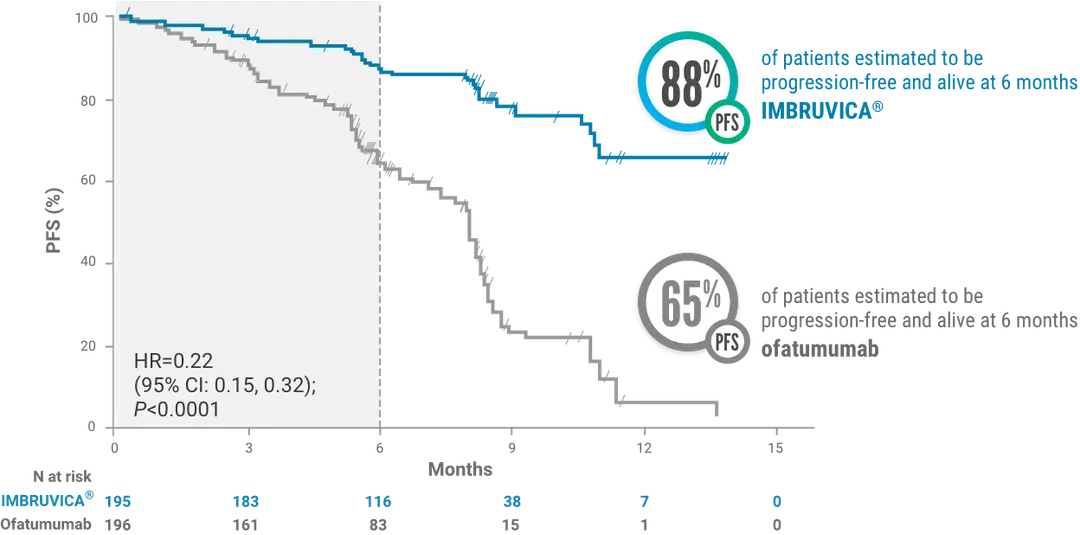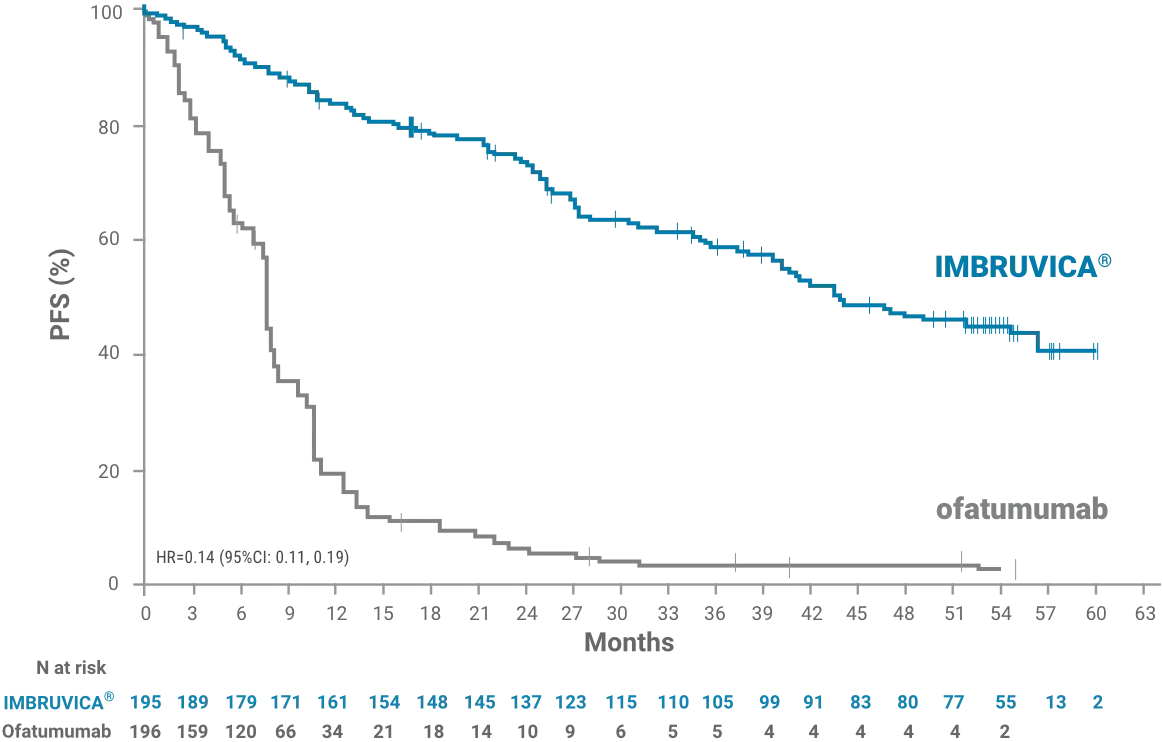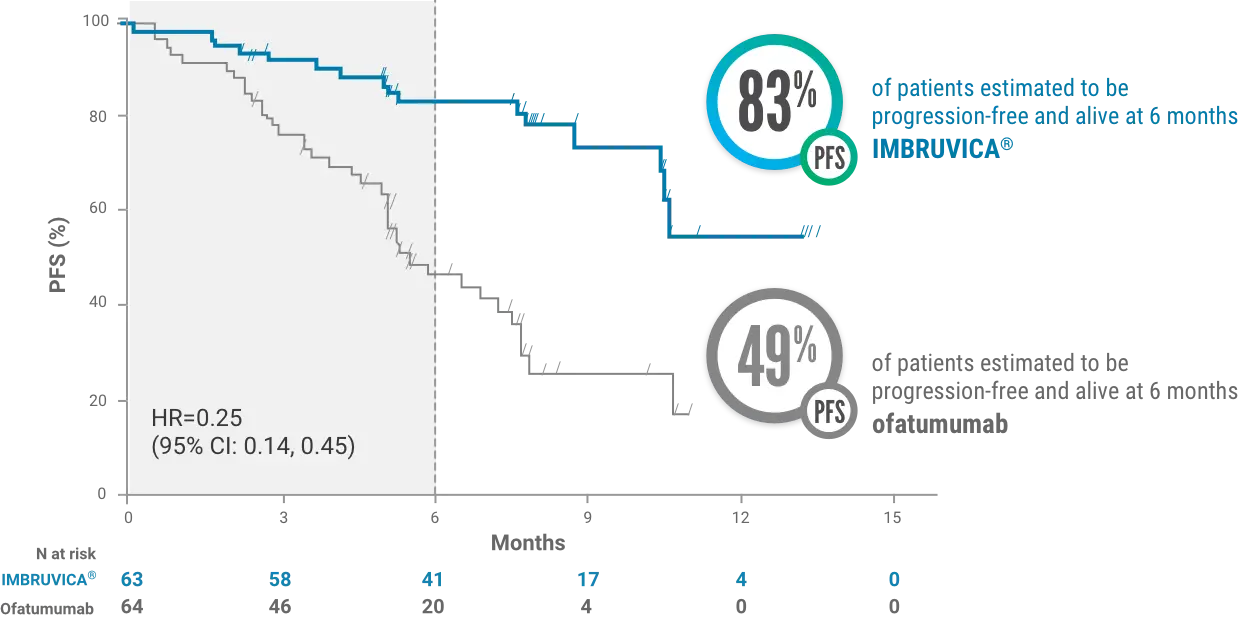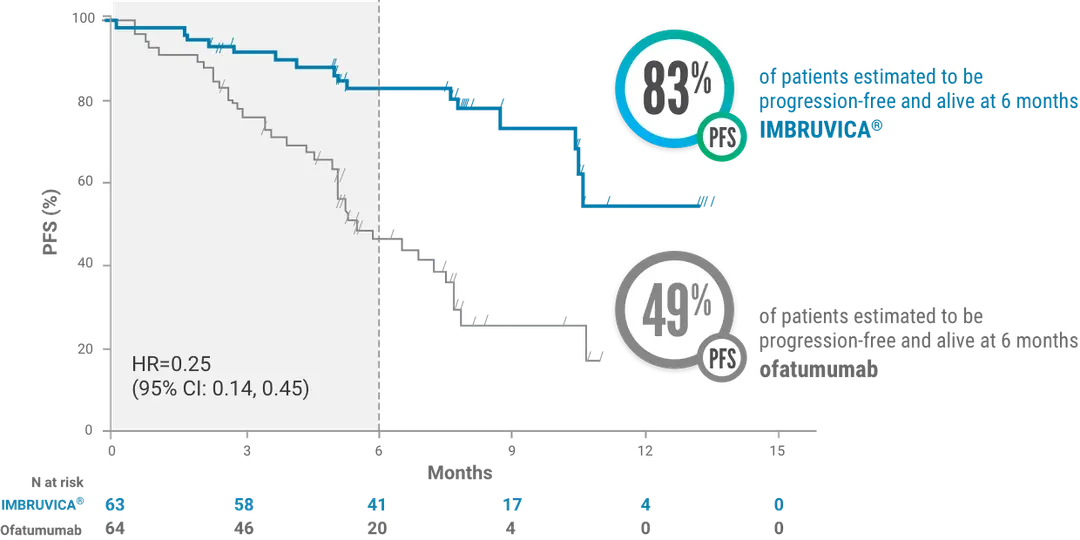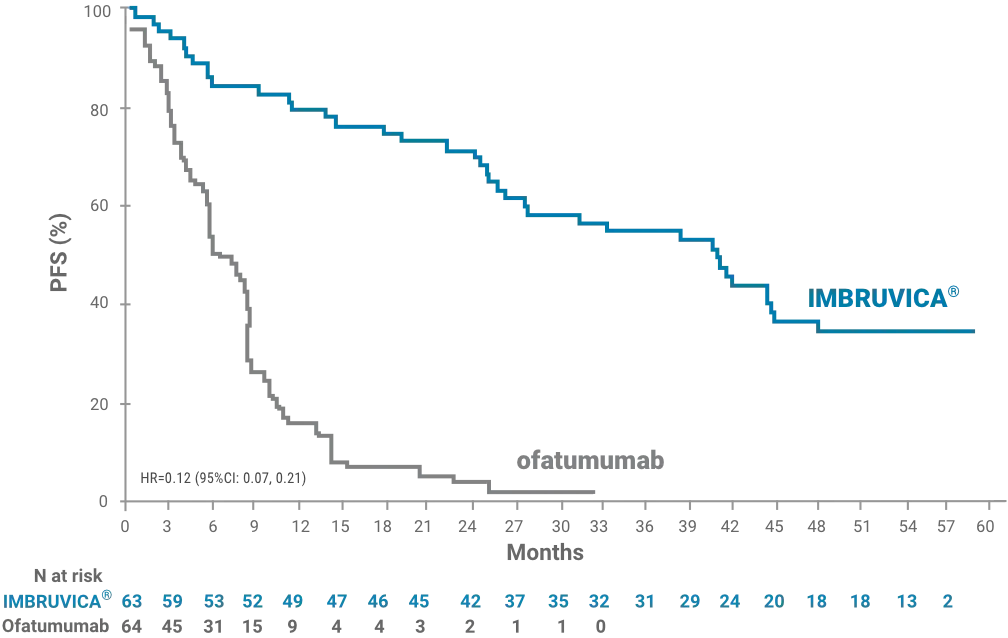WARNINGS AND PRECAUTIONS
Hemorrhage: Fatal bleeding events have occurred in patients who received IMBRUVICA®. Major hemorrhage (≥ Grade 3, serious, or any central nervous system events; e.g., intracranial hemorrhage [including subdural hematoma], gastrointestinal bleeding, hematuria, and post procedural hemorrhage) occurred in 4.2% of patients, with fatalities occurring in 0.4% of 2,838 patients who received IMBRUVICA® in 27 clinical trials. Bleeding events of any grade including bruising and petechiae occurred in 39%, and excluding bruising and petechiae occurred in 23% of patients who received IMBRUVICA®, respectively.
The mechanism for the bleeding events is not well understood.
Use of either anticoagulant or antiplatelet agents concomitantly with IMBRUVICA® increases the risk of major hemorrhage. Across clinical trials, 3.1% of 2,838 patients who received IMBRUVICA® without antiplatelet or anticoagulant therapy experienced major hemorrhage. The addition of antiplatelet therapy with or without anticoagulant therapy increased this percentage to 4.4%, and the addition of anticoagulant therapy with or without antiplatelet therapy increased this percentage to 6.1%. Consider the risks and benefits of anticoagulant or antiplatelet therapy when co-administered with IMBRUVICA®. Monitor for signs and symptoms of bleeding.
Consider the benefit-risk of withholding IMBRUVICA® for at least 3 to 7 days pre- and post-surgery depending upon the type of surgery and the risk of bleeding.
Infections: Fatal and non-fatal infections (including bacterial, viral, or fungal) have occurred with IMBRUVICA® therapy. Grade 3 or greater infections occurred in 21% of 1,476 patients with B-cell malignancies who received IMBRUVICA® in clinical trials. Cases of progressive multifocal leukoencephalopathy (PML) and Pneumocystis jirovecii pneumonia (PJP) have occurred in patients treated with IMBRUVICA®. Consider prophylaxis according to standard of care in patients who are at increased risk for opportunistic infections. Monitor and evaluate patients for fever and infections and treat appropriately.
Cardiac Arrhythmias, Cardiac Failure, and Sudden Death: Fatal and serious cardiac arrhythmias and cardiac failure have occurred with IMBRUVICA®. Deaths due to cardiac causes or sudden deaths occurred in 1% of 4,896 patients who received IMBRUVICA® in clinical trials, including in patients who received IMBRUVICA® in unapproved monotherapy or combination regimens. These adverse reactions occurred in patients with and without preexisting hypertension or cardiac comorbidities. Patients with cardiac comorbidities may be at greater risk of these events.
Grade 3 or greater ventricular tachyarrhythmias were reported in 0.2%, Grade 3 or greater atrial fibrillation and atrial flutter were reported in 3.7%, and Grade 3 or greater cardiac failure was reported in 1.3% of 4,896 patients who received IMBRUVICA® in clinical trials, including in patients who received IMBRUVICA® in unapproved monotherapy or combination regimens. These events have occurred particularly in patients with cardiac risk factors including hypertension and diabetes mellitus, a previous history of cardiac arrhythmias, and in patients with acute infections.
Evaluate cardiac history and function at baseline, and monitor patients for cardiac arrhythmias and cardiac function. Obtain further evaluation (e.g., ECG, echocardiogram) as indicated for patients who develop symptoms of arrhythmia (e.g., palpitations, lightheadedness, syncope, chest pain), new onset dyspnea, or other cardiovascular concerns. Manage cardiac arrhythmias and cardiac failure appropriately, follow dose modification guidelines, and consider the risks and benefits of continued IMBRUVICA® treatment.
Hypertension: Hypertension occurred in 19% of 1,476 patients with B-cell malignancies who received IMBRUVICA® in clinical trials. Grade 3 or greater hypertension occurred in 8% of patients. Based on data from a subset of these patients (N=1,124), the median time to onset was 5.9 months (range, 0 to 24 months). In a long-term safety analysis over 5 years of 1,284 patients with B-cell malignancies treated for a median of 36 months (range, 0 to 98 months), the cumulative rate of hypertension increased over time. The prevalence for Grade 3 or greater hypertension was 4% (year 0-1), 7% (year 1-2), 9% (year 2-3), 9% (year 3-4), and 9% (year 4-5); the overall incidence for the 5-year period was 11%. Monitor blood pressure in patients treated with IMBRUVICA®, initiate or adjust anti-hypertensive medication throughout treatment with IMBRUVICA® as appropriate, and follow dosage modification guidelines for Grade 3 or higher hypertension.
Cytopenias: In 645 patients with B-cell malignancies who received IMBRUVICA® as a single agent, grade 3 or 4 neutropenia occurred in 23% of patients, grade 3 or 4 thrombocytopenia in 8%, and grade 3 or 4 anemia in 2.8%, based on laboratory measurements. Monitor complete blood counts monthly.
Second Primary Malignancies: Other malignancies (10%), including non-skin carcinomas (3.9%), occurred among the 1,476 patients with B-cell malignancies who received IMBRUVICA® in clinical trials. The most frequent second primary malignancy was non-melanoma skin cancer (6%).
Hepatotoxicity, Including Drug-Induced Liver Injury: Hepatotoxicity, including severe, life-threatening, and potentially fatal cases of drug-induced liver injury (DILI), has occurred in patients treated with Bruton tyrosine kinase inhibitors, including IMBRUVICA®. Evaluate bilirubin and transaminases at baseline and throughout treatment with IMBRUVICA®. For patients who develop abnormal liver tests after IMBRUVICA®, monitor more frequently for liver test abnormalities and clinical signs and symptoms of hepatic toxicity. If DILI is suspected, withhold IMBRUVICA®. Upon confirmation of DILI, discontinue IMBRUVICA®.
Tumor Lysis Syndrome: Tumor lysis syndrome has been infrequently reported with IMBRUVICA®. Assess the baseline risk (e.g., high tumor burden) and take appropriate precautions. Monitor patients closely and treat as appropriate.
Embryo-Fetal Toxicity: Based on findings in animals, IMBRUVICA® can cause fetal harm when administered to a pregnant woman. Advise pregnant women of the potential risk to a fetus. Advise females of reproductive potential to use effective contraception during treatment with IMBRUVICA® and for 1 month after the last dose. Advise males with female partners of reproductive potential to use effective contraception during the same time period.
ADVERSE REACTIONS
B-cell Malignancies: The most common adverse reactions (≥30%) in adult patients with B-cell malignancies were thrombocytopenia (55%)*, diarrhea (44%), fatigue (39%), musculoskeletal pain (39%), neutropenia (39%)*, rash (36%), anemia (35%)*, bruising (32%), and nausea (30%).
The most common grade ≥3 adverse reactions (≥5%) in adult patients with B-cell malignancies were neutropenia (21%)*, thrombocytopenia (14%)*, pneumonia (8%), and hypertension (8%).
Approximately 9% (CLL/SLL) and 14% (WM) of adult patients had a dose reduction due to adverse reactions. Approximately 4%-10% (CLL/SLL) and 5% (WM) of adult patients discontinued due to adverse reactions.
cGVHD: The most common adverse reactions (≥20%) in adult or pediatric patients with cGVHD were fatigue (57%), anemia (49%)*, bruising (40%), diarrhea (36%), thrombocytopenia (33%)*, musculoskeletal pain (30%), pyrexia (30%), muscle spasms (29%), stomatitis (29%), hemorrhage (26%), nausea (26%), abdominal pain (23%), pneumonia (23%), and headache (21%).
The most common grade 3 or higher adverse reactions (≥5%) reported in adult or pediatric patients with cGVHD were pneumonia (14%), anemia (13%)*, fatigue (12%), pyrexia (11%), diarrhea (10%), neutropenia (10%)*, sepsis (10%), osteonecrosis (9%), stomatitis (9%), hypokalemia (7%), headache (5%), and musculoskeletal pain (5%).
Discontinuation of IMBRUVICA® treatment due to an adverse reaction occurred in 24% of adult patients and 23% of pediatric patients. Adverse reactions leading to dose reduction occurred in 26% of adult patients and 19% of pediatric patients.
*Treatment-emergent decreases (all grades) were based on laboratory measurements.
DRUG INTERACTIONS
CYP3A Inhibitors: Coadministration of IMBRUVICA® with strong or moderate CYP3A inhibitors may increase ibrutinib plasma concentrations. Increased ibrutinib concentrations may increase the risk of drug-related toxicity. Dose modifications of IMBRUVICA® are recommended when used concomitantly with posaconazole, voriconazole, and moderate CYP3A inhibitors. Avoid concomitant use of other strong CYP3A inhibitors. Interrupt IMBRUVICA® if strong inhibitors are used short-term (e.g., for ≤7 days). Avoid grapefruit and Seville oranges during IMBRUVICA® treatment, as these contain strong or moderate inhibitors of CYP3A. See dose modification guidelines in USPI sections 2.3 and 7.1.
CYP3A Inducers: Avoid coadministration with strong CYP3A inducers.
SPECIFIC POPULATIONS
Pediatric Use: The safety and effectiveness of IMBRUVICA® have not been established for the treatment of cGVHD after failure of one or more lines of therapy in pediatric patients less than 1 year of age. The safety and effectiveness of IMBRUVICA® in pediatric patients have not been established in CLL/SLL, CLL/SLL with 17p deletion, WM, or in patients with mature B-cell non-Hodgkin lymphoma.
In the randomized population from a study that included 35 patients (26 pediatric patients age 5 to less than 17 years) with previously treated mature B-cell non-Hodgkin lymphoma, major hemorrhage and discontinuation of chemoimmunotherapy due to adverse reactions occurred more frequently in the ibrutinib plus chemoimmunotherapy arm compared to the chemoimmunotherapy alone arm.
Hepatic Impairment:
Adult Patients with B-cell Malignancies: Hepatic impairment (based on Child-Pugh criteria). Avoid use of IMBRUVICA® in patients with severe hepatic impairment. In patients with mild or moderate impairment, reduce recommended IMBRUVICA® dose and monitor more frequently for adverse reactions of IMBRUVICA®.
Patients with cGVHD: Avoid use of IMBRUVICA® in patients with total bilirubin level >3x upper limit of normal (ULN) (unless of non-hepatic origin or due to Gilbert’s syndrome). Reduce recommended dose when administering IMBRUVICA® to patients with total bilirubin level >1.5 to 3x ULN (unless of non-hepatic origin or due to Gilbert’s syndrome).


